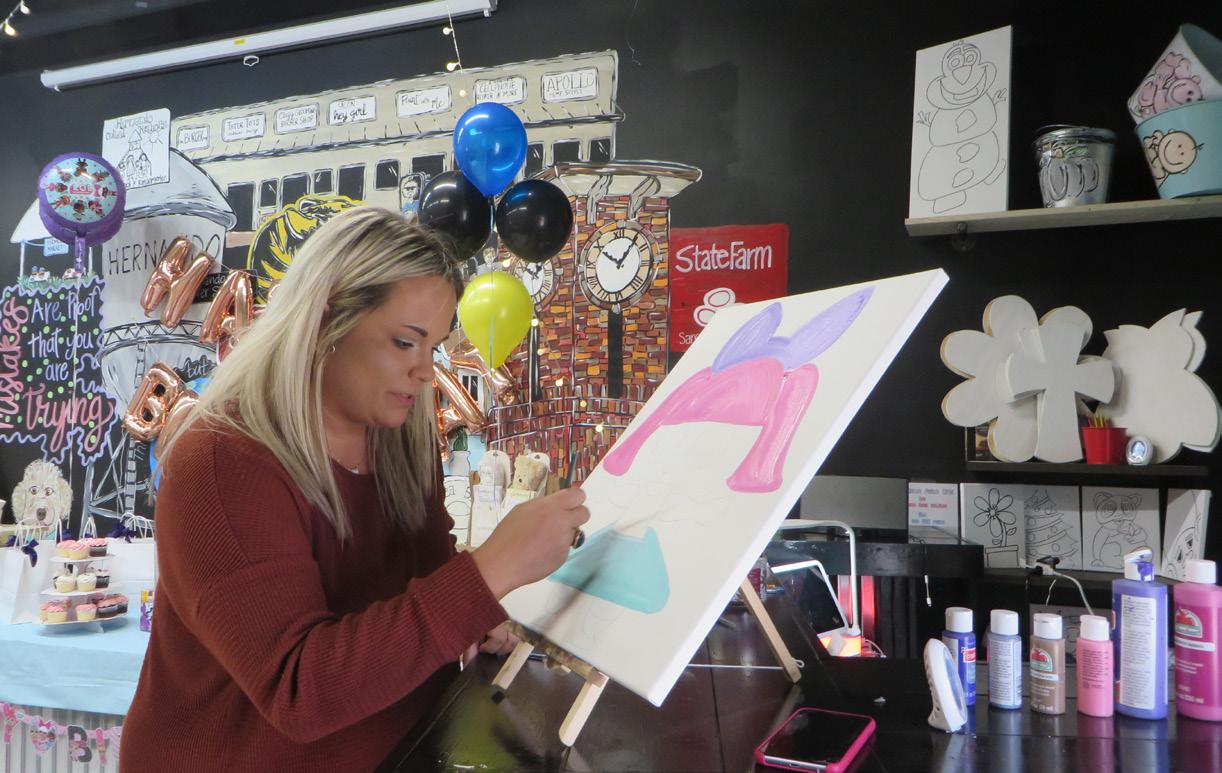
18 minute read
Homegrown
A Painter’s Perseverance
Story and photography by Karen Ott Mayer
Advertisement
Everyone is an artist at Paint with Me in Hernando, thanks to the tenacity of its owner who didn’t let a pandemic slow her down.
Lifelong artist Rochelle Carpenter reflects a tenacity born from true need. When she decided to open a retail paint and pottery studio in her hometown of Hernando, Miss., fulfilling a lifelong dream, the word pandemic figured nowhere in her business plan. She opened Paint with Me in January 2020 and hasn’t looked back. “I have always loved art and painting. I have always liked to make my own things, like homemade decorations or repurposed pieces,” she says. “I felt like this idea was really placed on my heart.” Carpenter studied art all through school, taking advanced art in high school, so expanding into an art career felt like a natural move. Plus, with an autistic son, she sought ways to care for him while pursuing her own passion for art as a stay-at-home mom. But after years of selling painted wooden art like door hangers, and taking custom orders from her home, she wondered if it wasn’t time to consider her own space. “I also sold through Commerce Street Market but just reached a point when I thought it would be more practical to open my own shop,” she says. She began looking for a space and found a new building located just south of the historic Hernando Square on Highway 51. “It was a brand new building and I wasn’t sure about taking it on,” she relates, adding that in the end, she chose the space and began making it her own. “I literally worked on it day and night through January 2020. It took forever to paint because I did colorful vertical stripes on one wall and a mural of Hernando on the other one. I poured my heart into it.” Like any busy entrepreneur, Carpenter enlisted the help of family. Her husband, Charlie, supports her work by helping with all the wooden cutouts. “He works one week on, then another off,” she says. “When he’s home, he’s busy cutting wood for me.” Today, Paint with Me draws a steady and loyal crowd that shows up to either paint on canvas or pottery. The cheerful space is usually a beehive of activity as kids and parents gather around tables to create their own art. Carpenter hosts events and celebrations from birthday parties to girls-night-out parties.
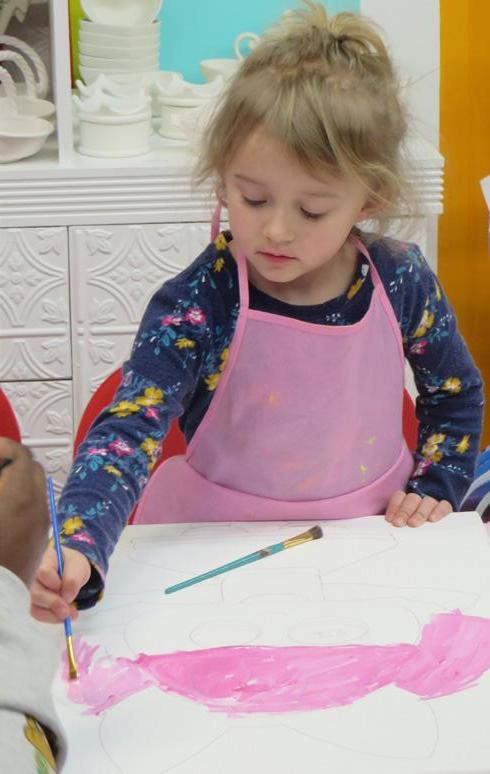

Carpenter incorporated pottery in the store recently, selling pieces and allowing customers to make their own. She contacted Olympic, which produces pottery kilns, and they trained her on the use of her kiln and the aspects of selling pottery. “I took an online class from the company located in Massachusetts and they were great,” she says. “They gave me a business plan and helped me get started. I’m still learning.” Customers can choose from dozens of pottery pieces to make their own creations, from whimsical characters to kitchenware and serving pieces. Carpenter says even a two-year old can paint pottery. Once the pieces are painted, Carpenter fires them in her kiln every Saturday. The weekly turnaround makes it convenient for customers to quickly pick up their creations. “I have some people who come every week to paint a piece (of pottery),” says Carpenter. “Even if they’re mixing crazy colors, each piece is unique and they all turn out beautiful.” Carpenter has also discovered the beauty of imprinting a baby’s handprint in clay as a keepsake. At her 2020 grand opening, business was brisk as she sold hundreds of T-shirts and dozens of door hangers. Everything seemed to be falling into place. And then, the pandemic arrived. Like so many other owners, Carpenter shut her doors but moved quickly to custom orders and working with vendors like the DeSoto County School District where she had strong support among friends and teachers. She offered online classes until June 2020, when she reopened the shop. “I don’t consider myself a teacher but I started online classes,” she says. “I put together online kits and showed customers how to mix colors and paints, teaching them step by step how to paint a canvas. For instance, we painted Peter Rabbit for Easter.” In February, Paint with Me celebrated its one-year anniversary, holding an open house amidst the continued COVID-19 restrictions. Carpenter is now booking parties again, respecting required space and masks. Despite general uncertainty about opening a business during a pandemic, Carpenter knows she made the right decision. “Something was telling me to open the store and the time was right despite everything.” Looking ahead, the calendar gets even busier for Paint with Me. Carpenter’s planning a summer camp for all age groups and additional themed parties. Having created sellable art for more than five years, including thousands of painted Christmas ornaments, Carpenter believes quietly in her own talent and new business. More importantly, her infectious and dedicated attitude inspires others to get involved and make a little art. Her biggest problem these days? “Keeping track of requests because they come through Facebook, Instagram, my personal Facebook, and texts!” To learn more about Paint with Me, contact the store at (662) 469-1293 or visit them on Facebook.
Karen Ott Mayer writes, gardens, and enjoys good food from her farm in Como, Miss.
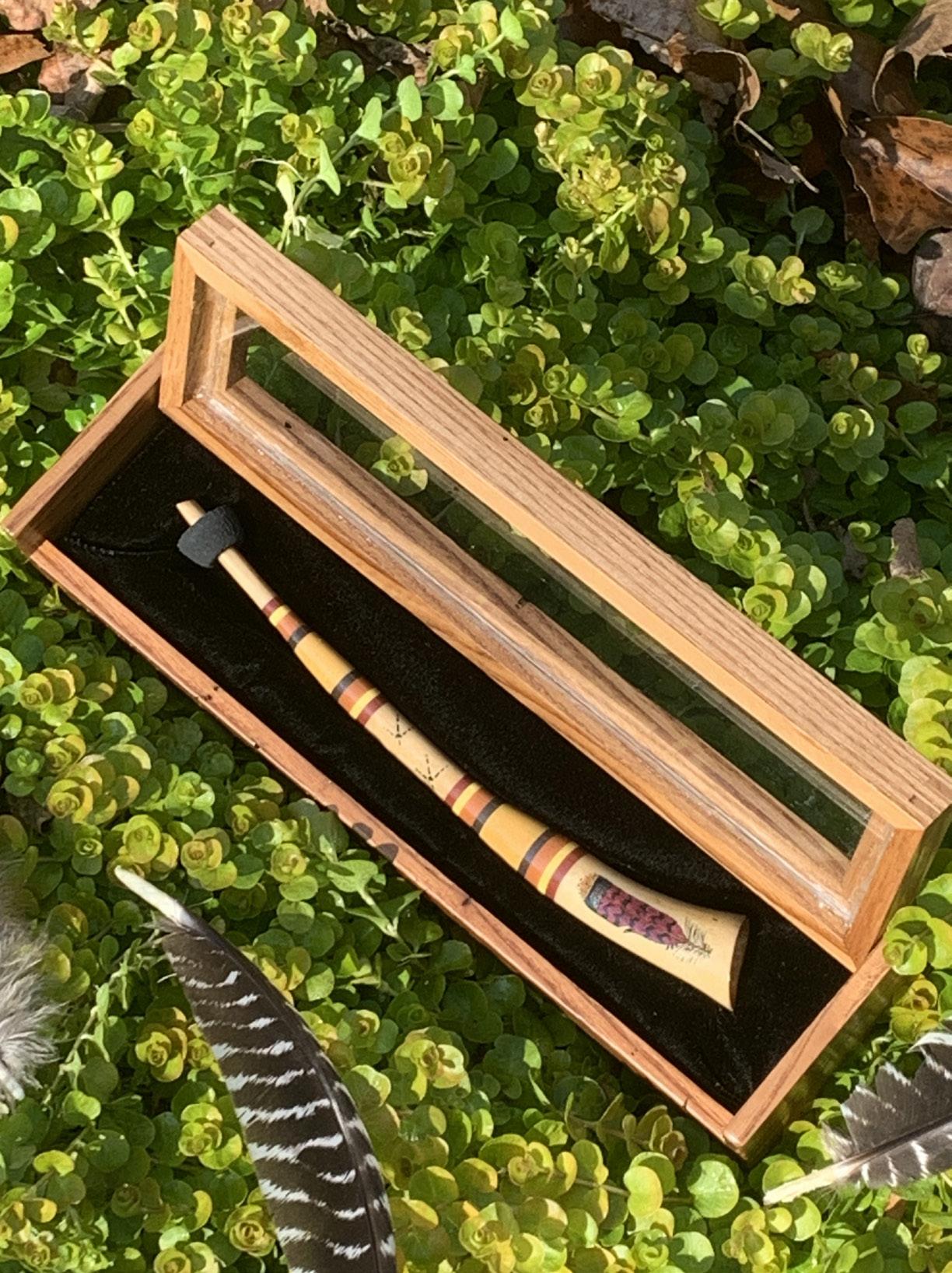
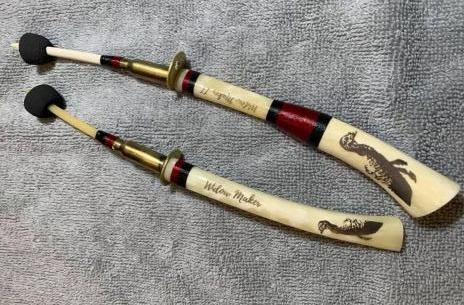
Grand Slam Turkey Calls
By Jason Frye | Photography courtesy Fred Cox/Grand Slam Turkey Calls
Knowing how to talk turkey is an artform that North Carolina’s Fred Cox has perfected.
Spring comes twice for turkey hunters. Once with the equinox, then again about two weeks later when spring gobbler season opens. For Reidsville, N.C.’s Fred Cox, this second spring means getting into the woods with his grandkids for the first day of youth-only hunting. This year he hopes to call in a big tom or two, drawing the birds close with calls of his own making. Maybe this year it’ll be his granddaughter who dispatches a strutter or his grandson who bags a big, bearded beauty for dinner. Regardless, Cox will be there, call in hand, ready to converse and say, “Food… hens…a rival male…this way, come see.” Cox knows how to talk turkey. He’s been calling them since 1969 (longer than many of us Southern Gentlemen here have been alive) and seriously making his own calls since 1995 as Grand Slam Turkey Calls. A lifelong outdoorsman, he caught the turkey bug in high school, when one of his teachers took him hunting. “Oh, on that first trip into the woods, I was hooked,” says Cox. “Back then, North Carolina only had one turkey season — in fall — so you had to fill the year with something else, but all I wanted to do was get back in the woods and find some birds.” Filling those out-of-hunting-season days with something hunting-adjacent wasn’t difficult. Cox began to accompany his teacher to small gatherings of hunters, then to small trade shows, then to wildlife- and hunting-oriented dinners.
Walking in to one such function at Alamance High School, Cox heard it: a yelp, then a cluck, then more yelps. Turkey! But he was in a gymnasium, not the woods, so it couldn’t be a turkey. Still, the sound was so lifelike. He had to know what made this noise. He followed the sound to a booth where a man held a turkey wing-bone call to his lips, pursed them, and called.



“It was about the purtiest sound I’d heard,” Cox says, not knowing that a few decades down the road, he’d be producing one of the most sought-after wingbone calls in the South. In 2020, Grand Slam Turkey Calls was named Outdoors Runner-Up in Garden & Gun Magazine’s prestigious Made in the South Awards. “Standing in that gym, I never imagined I’d be making my own wingbone calls, much less that I’d be selling them,” he says. Turkey calls come in many forms and Cox makes and sells most of them as Grand Slam Turkey Calls. There are diaphragms, which you wear like a retainer and manipulate with your breath. You’ve got friction calls, which use a striker rubbed against a metal plate or block of wood to create turkey-like sounds. Pot calls, which are a type of friction call, have a striker that you rub against a glass, ceramic or aluminum plate. Scratch boxes and box calls often use wood-on-wood to replicate calls, though you’ll find other materials from time to time. And then there are wingbones. Wingbones are just that — a pair or trio of bones from a turkey’s wing, dried and cleaned and fitted together, then “played” for every tom and hen in earshot. Rather than use friction like many other calls, hunters place a wingbone against their lips like they’re going to play a recorder. Instead of pursing their lips and blowing, you cup your hands around the bottom of the call and suck air through the hollow bones. As you draw air through, the clucks and yelps that emerge are music to a turkey’s ears. “They’re simple calls, really, and an old design,” says Cox. “Wingbone calls — or what’s left of them — have been found by archaeologists excavating Native American villages. The oldest one found was about 6,500 years old.” To make a wingbone call you need the radius, ulna, and humerus bones from a turkey’s wing. Clean the bones and clip off the ends, then boil them and clean out the marrow. From here, take some sandpaper and grind one end of the radius to fit into the ulna, and one end of the ulna to fit into the humerus. Your simple wingbone is essentially complete.
Cox builds his to last, taking care on the fit, gluing the pieces together, adding a little stopper to keep your lips in the right position, wrapping the joints in thread, and decorating the call with drawings inspired by the woods. Most years you’d find Cox setting up the Grand Slam Turkey Call booth at trade shows and outdoor expos, but this past year has been a bit different. Thanks to the Made in the South Awards, his online orders have been steady. But he’s not too busy to hunt. He’s got his eyes on the “grand slam” of turkey hunting. To do this Cox needs to bag each of the four species found in the United States: Eastern, Merriam’s, Osceola, and Rio Grande. He’s one away and needs only the Merriam to make his mark. As soon as it’s a good idea to travel, he’ll be headed to the Dakotas to pit his call against the last bird on his list.
grandslamturkeycalls.com
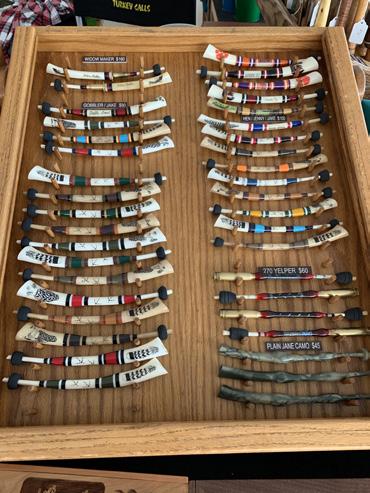
Jason Frye lives on the coast of North Carolina where he writes about travel, food, and culture. Follow his adventuress on Instagram where he’s @beardedwriter, and watch bookshelves for his new travel guide, Moon Blue Ridge Parkway Road Trips, hitting shelves in May 2021.


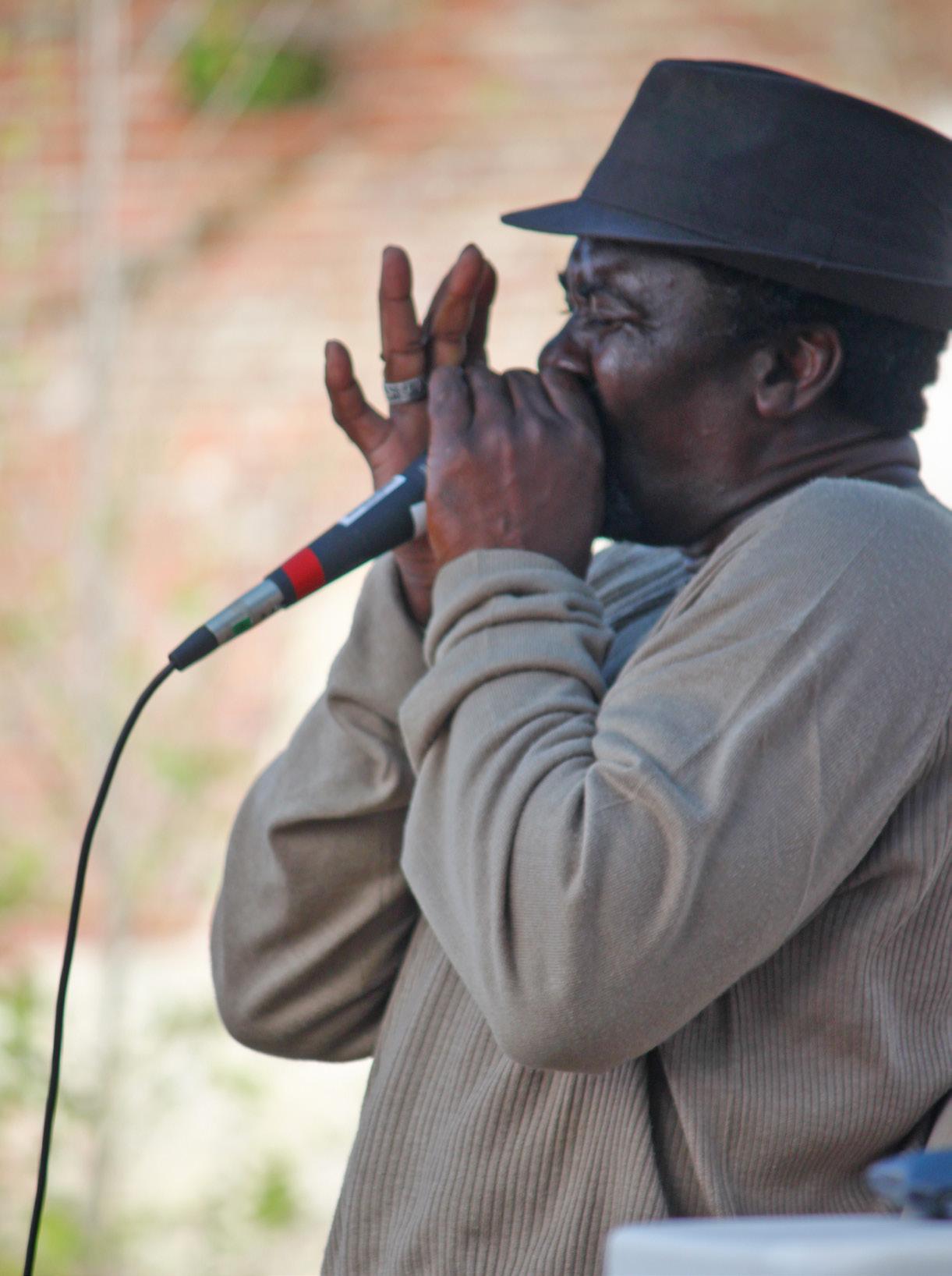

Cool Bean
By Tracy Morin | Photography courtesy of Rhonda J. Lewis
With his unique style and one-man-band approach, Terry ‘Harmonica’ Bean travels far from his Pontotoc home to keep Mississippi’s blues traditions alive.
Terry “Harmonica” Bean was born into the blues. His father, Eddie, and grandfather, Rossie, played in local juke joints around northeast Mississippi, performing alongside men shooting dice and sipping bootleg liquor. Packed into a large family with 24 siblings, Bean emerged as a special talent, but playing blues music wasn’t his original career plan. He was a star baseball player, eyeing the Major Leagues in 1980, fresh out of high school. A serious motorcycle accident derailed those plans, and he started playing blues on the side. “I played at friends’ houses, then the next thing on street corners, just having fun,” Bean recalls. “I’m like Grandpa Rossie — waiting on a big fish to come, I’ll catch a lot of little bitty ones. The big ones come once in a while. But I played on street corners for eight years, for nothing.” That changed when some Italian visitors looking for bluesman John L. Watson stumbled upon Bean in West Helena, Ark. Bean not only led them to their target but got picked up himself to play in Europe. That was in 2001, and word of mouth grew from there. Bean eventually found himself traveling the world to spread his style of the blues. Pontotoc may not be as famous as the Mississippi Delta or Memphis for its blues traditions, but in fact numerous musicians have been shaped in this Hill Country setting between the Delta and Tupelo, the latter the home of the legendary rock-and-roller who helped “open the door for black

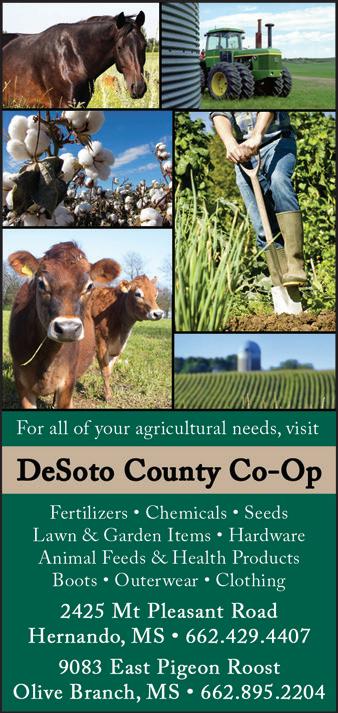
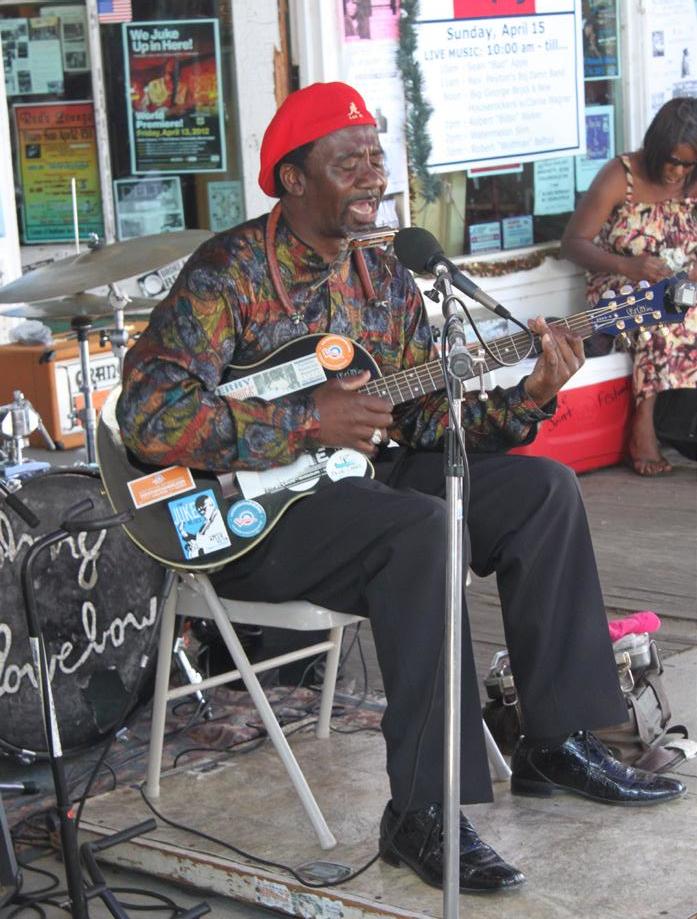
people’s music,” according to Bean. Pontotoc has its own rich musical history, full of names remembered like Muddy Waters band member Leroy Foster, but also many who never recorded and who are lost to history. But those unnamed musicians are alive and well in Bean’s memory, and in his songs — along with the traditions of the Delta and Hill Country legends like Mississippi Fred McDowell. “You have to do your own thing, so I just mix it all up together,” Bean says. “I got my grandfather, the Delta, the Hill Country, and Terry ‘Harmonica’ Bean in there. I never had money to promote myself. I just got out and let people see me. You have to do it for nothing to get something.” Luckily, Bean’s unique style is one that audiences around the world love to see. He was able to commit to his music and touring full-time in the late 2000s, and for the past 15 years or so — in addition to annual gigs at major Mississippi events, like this month’s Juke Joint Festival in Clarksdale — fans can find him throughout the year in far-flung locales, from Australia and Africa to Russia and Japan. “The blues carried me to places I never thought I’d be,” Bean says. “My father told me, ‘Son, you didn’t make the Major Leagues. You was good at that, but that’s not what God planned. Just play the blues, it’ll do something for you.’” And, even when Bean travels no farther than Clarksdale, the world comes to him, with blues lovers from around the globe making the pilgrimage to down-home clubs like Red’s Lounge, which keep the traditions of real-deal blues alive and well today.
Though Bean maintains relations with a full band to work with upon request, he usually appears solo, one man band-style. That evolution happened naturally back in 1989 when his band had booked a gig and he was the only one who showed. A fellow bluesman told him, “You play harmonica. Why don’t you play by yourself, and you won’t have that problem.” “The next week, I bought me a harmonica rack and started playing by myself,” Bean remembers. “That’s when everything took off for me. Now, people want me to play alone.” Of course, that arrangement not only simplifies the operation; it puts any performance money solely into Bean’s pocket. In fact, even today, he doesn’t take bookings through an agent, preferring to arrange gigs personally, accepting them on his own terms. In other words, he remains a one-man band even in business. “I don’t want to be controlling no one, and I don’t want to be controlled,” Bean explains. “I’m my own man, and I play for whoever. I think that’s the way it should be. When you take the fun out of anything, you might as well throw it away; it ain’t no good no more.” Bean, who turned 60 last January, also enjoys breaking myths about the genre so often called “the devil’s music.” Tracing its roots in Africa to the farmed fields of Mississippi, Bean asserts that the music is no different than gospel tunes played in church. “When I’m playing blues, I’m going to give you some history on it,” Bean says. “The blues is a very serious kind of music, but when I was a boy coming up, I saw people listening to the music and having a good time. It’s fun to me. I love people, myself, and I love making people smile.”
facebook.com/terryharmonicabean
Based in Oxford, Miss., Tracy Morin is an award-winning freelance writer and editor with a passion for covering food, beverage, beauty, and boxing.

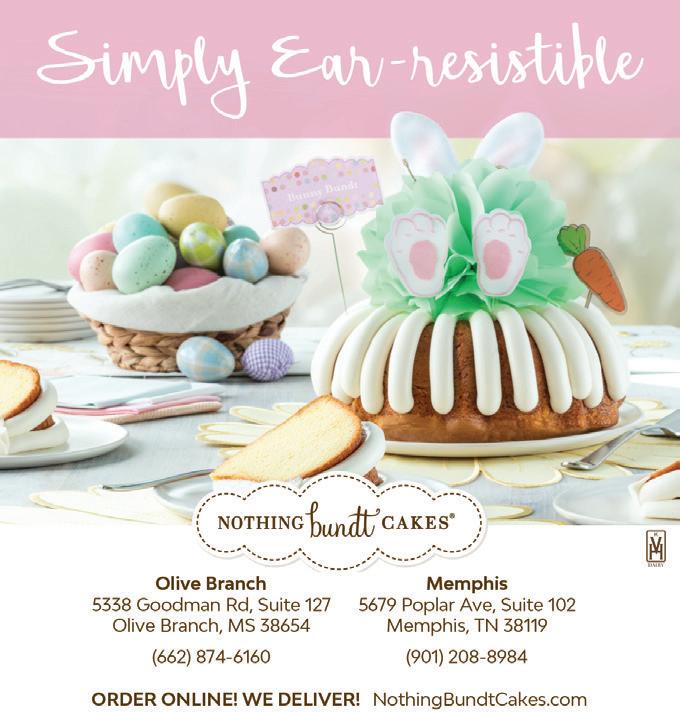
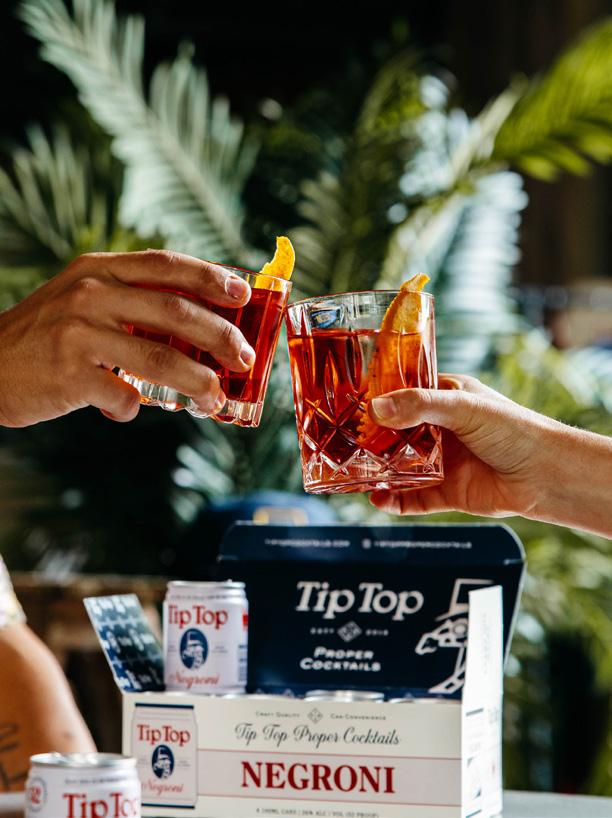
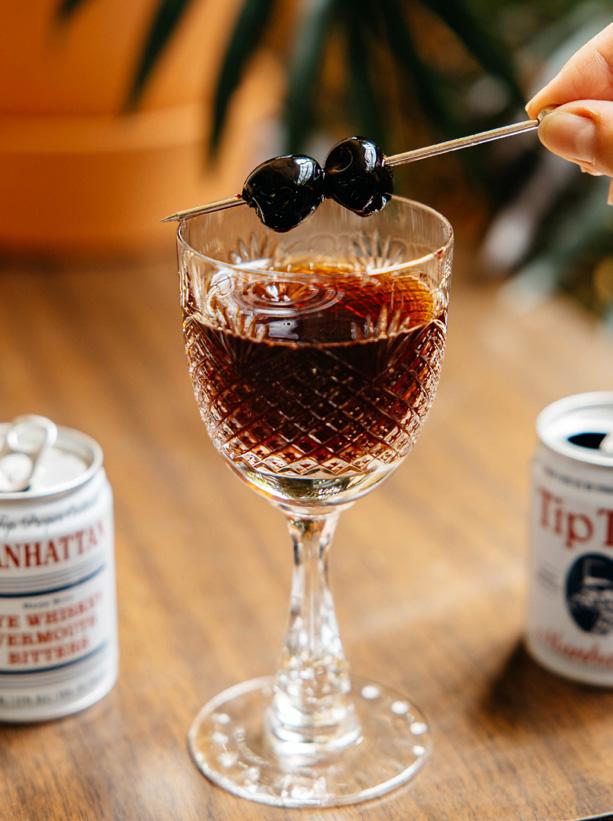
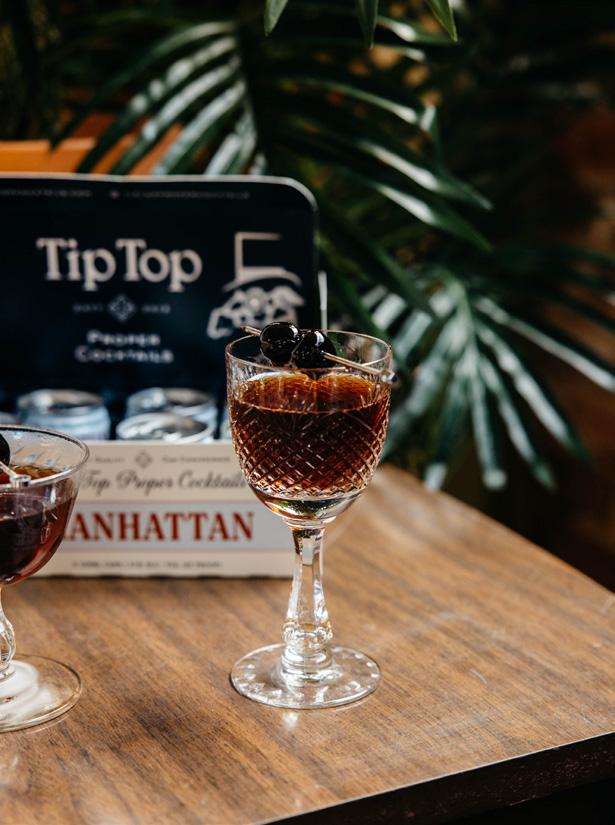
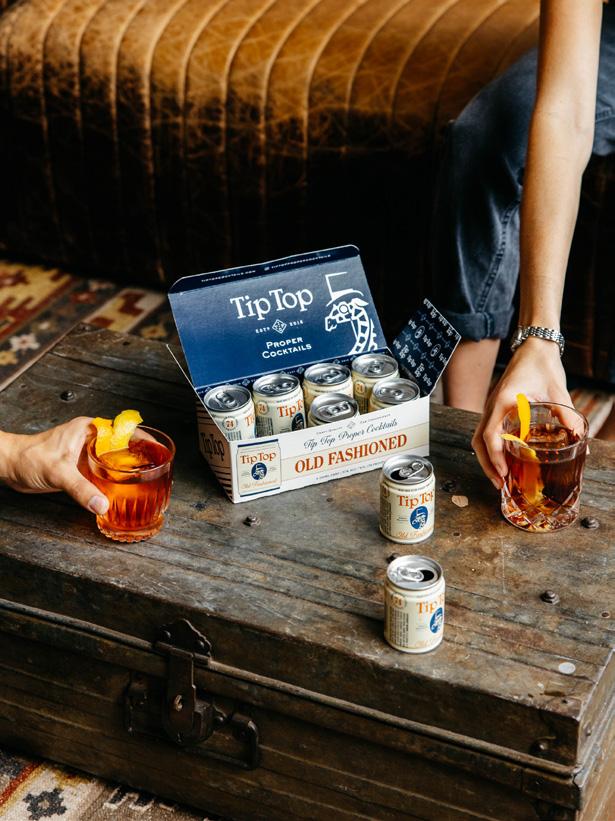
Cocktails in a Can

By Cheré Coen | Photography Courtesy of Luke Beard
Atlanta company offers convenience, taste, and affordability with their line of Tip Top Proper Cocktails.
Neal Cohen and Yoni Reisman were childhood friends growing up in Atlanta, and both “rabid music lovers,” attending numerous music festivals and events. “We were determined to get in that line of work,” Cohen relates. And they did. Reisman helped establish an entertainment company that produced the Governor’s Ball Music Festival in New York, and Cohen served as marketing director for Bonnaroo Music and Arts Festival in Tennessee, among other jobs. What they thought would be their dream careers ended up leading to something entirely different. As Reisman sat next to the concessions at festivals, he noticed something lacking. Customers could purchase beer, wine, and possibly a rum and Coke at the events but not a cocktail. With good reason. Cocktails require several ingredients and a knowledge of their assembly, which meant hauling numerous glass bottles to the outside venues and an educated staff. Cocktail creation is also time-consuming, making it unfeasible for crowds. In essence, serving cocktails at music festivals wasn’t conducive to that environment. But, that didn’t stop the duo. “There was a hole to what was available to the attendee,” Cohen says. “We saw a need to solve that problem.” Cohen and Reisman created Tip Top Proper Cocktails, three-ingredient cocktails in a can that consumers can open, pour on ice (or straight from the can if chilled), and enjoy. They started with three classic America cocktails — a Manhattan (rye whiskey, vermouth, and bitters), an old-fashioned (whiskey, sugar, and bitters), and a Negroni (dry gin, vermouth, and red bitters).
Cocktails-to-go are part of an explosive nationwide trend, but the Tip Top duo knew that developing the right recipe would be tricky, particularly for those with sophisticated palates. They enlisted mixologist Miles Macquarrie, whose work at the Kimball House in Atlanta has earned him several James Beard bar of the year award nominations. Each “stirred cocktail” contains three ingredients inside a durable steel can. Having a ready-made cocktail eliminates the need to keep bar ingredients on hand, reduces the time involved to make a cocktail, and provides a way to bring cocktails to places where glass is prohibited. Tip Top cocktails are especially handy when traveling, easy to slip inside backpacks, in luggage, and to enjoy at the pool or beach, Cohen says. Because they contain alcohol, they won’t freeze, so can be placed inside freezers for a nice chill. They’re also affordable, retailing for $4 to $6 a can. Because they’re so convenient, hotels and restaurants without a well-stocked bar service use them for guests. They’re perfect for fast casual restaurants, dive bars, and on golf courses at country clubs, Cohen says. For now, Tip Top Proper Cocktails are only available in certain states, but can be shipped throughout most of the country. Each state requires its own distribution standards, Cohen explains, so it’s a slow process expanding their reach as they move forward. The cocktails are available in some large retail stores, such as Total Wine in Georgia and South Carolina. The word is out for these convenience cocktails — the drinks won the Drink category in Garden & Gun’s Made in the South Awards this year and have been featured in numerous national publications. Plans are in the works to expand the product line this spring. Next up are three “shaken cocktails,” a margarita, a traditional daiquiri made of rum, lime and sugar, and a Bees Knees consisting of gin, honey and lemon. It might not be Bonnaroo, but the lifelong friends aren’t complaining. “We’re having a really good time,” Cohen says.
tiptopcocktails.com
DeSoto Magazine Co-editor Cheré Coen adores a well-made old-fashioned but loves the chance to pour one easily. She’ll be taking Neal Cohen’s advice and expressing an orange slice into the canned cocktail and garnishing the rim.





